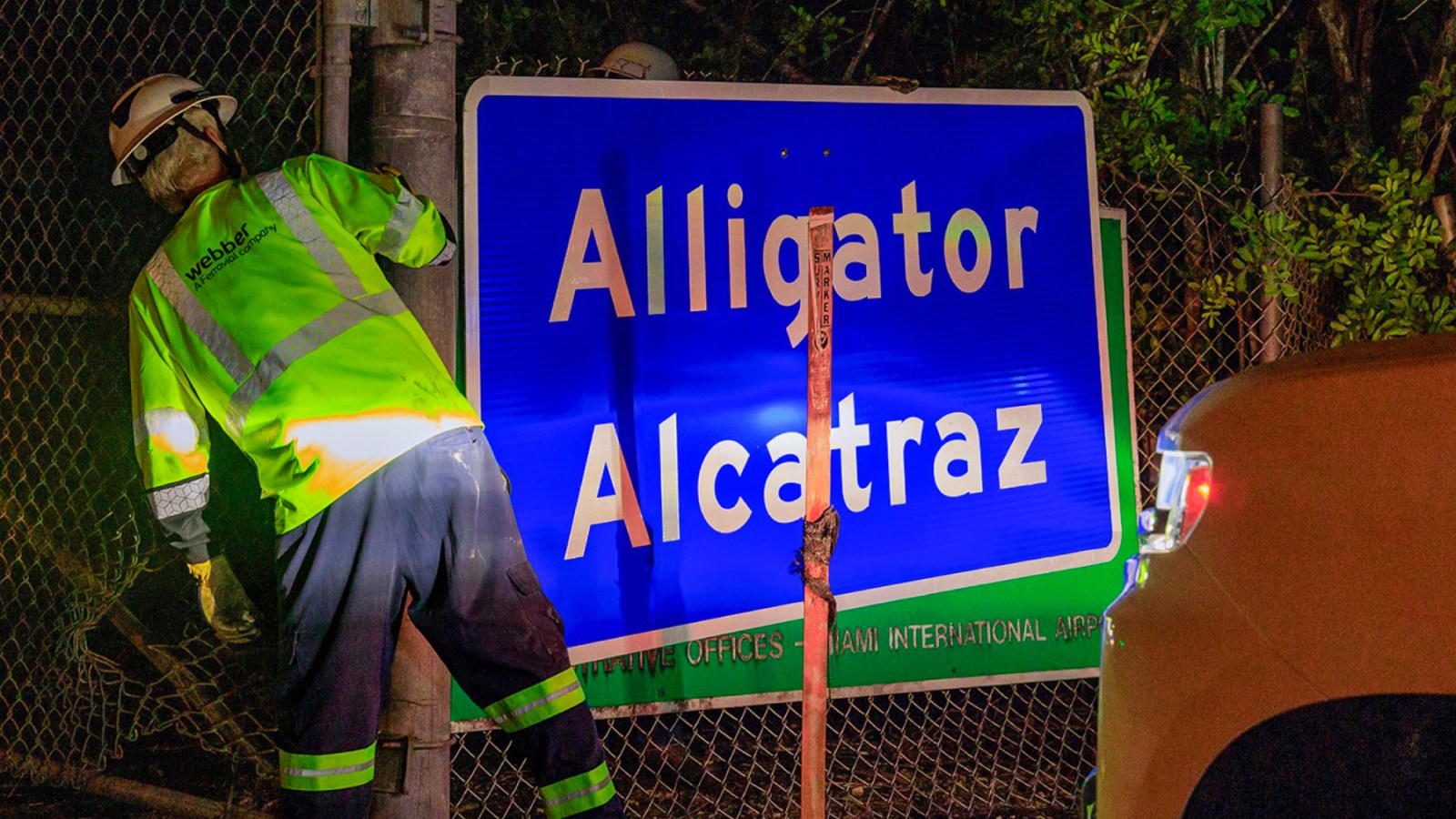
Experts are concerned about the dangerous conditions at Alligator Alcatraz, the immigrant detention center that opened Tuesday in the Florida Everglades. Hurricanes, flooding, and mosquitoes pose a more likely threat to people incarcerated there than the alligators and snakes that President Donald Trump has “joked” about.
Built in eight days, the facility consists of large tents, bunk beds, and chain link fences that form cages to hold about 3,000 people. It has already flooded once. Despite the rudimentary setup, it will cost $450 million a year to run, according to Department of Homeland Security Secretary Kristi Noem.
The first group of immigrants have already been brought to Alligator Alcatraz, according to the Florida Division of Emergency Management. “Florida is proud to help facilitate @realDonaldTrump’s mission to enforce immigration law,” the division posted on X.
The facility’s inhospitable nature is a selling point for Republicans. “If people get out, there’s not much waiting for them other than alligators and pythons,” Florida Attorney General James Uthmeier said in a video promoting Alligator Alcatraz. “Nowhere to go, nowhere to hide.”
The immigrants “are in a facility that is very inaccessible to lawyers, to family members, to oversight,” Renata Bozzetto, deputy director of the Florida Immigrant Coalition, told The Washington Post in an article published Saturday. “So the location being so remote and isolated is a problem. Being in an environmentally fragile ecosystem is a problem. Being constructed with temporary materials will be catastrophic in case of a hurricane.”
The facility is in a High-Velocity Hurricane Zone, where building code requires that buildings have a wind-resistant design. Florida’s Emergency Management Director, Kevin Guthrie, told The Washington Post that the structures are rated for winds traveling 110 miles an hour. For reference, top speeds of last year’s Hurricane Milton reached 180 miles per hour.
In a state where backyard pools are surrounded on all sides by screens, the mosquitos are so bad that television reporters are even having trouble doing their jobs.
“You’re probably wondering why I’m wearing a hoodie and a rain jacket, and that’s because you can barely walk outside here because of the mosquitoes,” said NBC6’s Hatzel Vela. “Naturally, when you get a lot of rain and puddles of water, that of course breeds a lot of mosquitoes.”
The mosquitoes can cause serious health risks.
“The risk of mosquito-borne disease at this site is significant,” Durland Fish, professor emeritus of epidemiology at the Yale University School of Public Health told The Washington Post. Mosquitoes in the Everglades can cause neurological damage like encephalitis, which can be life threatening.
“The second you open up your car, your car is infested with mosquitoes,” Florida Rep. Anna Eskamani told Fox 13. She said she wore a mosquito net and was still bitten dozens of times.
Eskamani was one of five Democrats who were denied entry to the facility on Thursday.
“Florida law gives legislators the authority to make unannounced visits to state-run facilities — to inspect conditions and check on the wellbeing of the people inside. I’ve served in the Legislature for 13 years, and this has never happened,” state Sen. Shevrin Jones posted on X.
“This is a blatant abuse of power and an attempt to conceal human rights violations from the public eye,” the lawmakers said in a joint statement.
Republicans have gleefully supported the facility’s construction, with the Florida Republican Party selling merchandise promoting the camp.
Some donors are cashing in on the camp, Rolling Stone reported earlier this week. For example, the president of CDR Companies, which Bloomberg reported “will run medical services and did some site preparation,” has made donations to President Donald Trump and Florida Governor Ron DeSantis.
The facility is surrounded on three sides by the homes of Miccosukee and Seminole people, including their ceremonial sites.
“It’s a place where we come for healing, where we come to pray,” Betty Osceola, a member of the Everglades Advisory Board and the Miccosukee Tribe told NBC News.